Your Jeep squeaks when you drive due to worn-out or improperly lubricated suspension components such as bushings, ball joints, or control arms. If your Jeep produces squeaking noises while driving, it indicates potential issues with the suspension system.
Several factors can contribute to these annoying sounds, including worn-out or incorrectly lubricated components like bushings, ball joints, or control arms. Identifying the specific source of the squeaks is crucial to address and resolve the problem effectively. Neglecting these issues may lead to further damage and compromise the safety and performance of your beloved Jeep.
We will explore the common causes of Jeep squeaking while driving and provide possible solutions to fix this annoying problem.
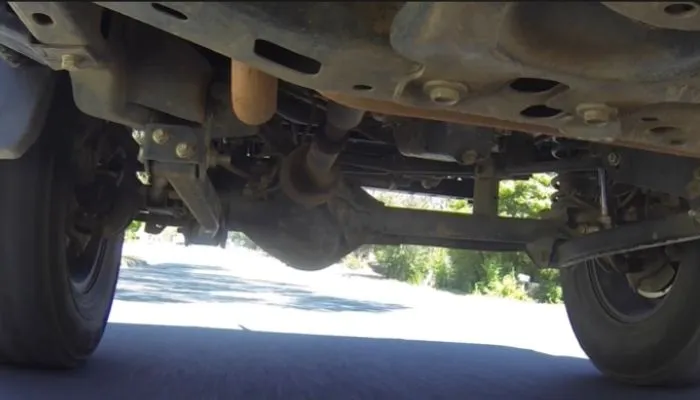
Identifying The Jeep Squeak
If you’re wondering why your Jeep squeaks while driving, identifying the source of the noise is crucial. Learn how to pinpoint and address the squeak in your Jeep to ensure a smooth and enjoyable ride.
When Does The Squeak Occur?
One of the first steps in identifying why your Jeep is squeaking when you drive is determining when exactly the squeak occurs. Does it happen when you start the engine and continue throughout your drive, or does it only happen when you turn the steering wheel or go over bumps? It’s important to pay attention to the timing of the squeak as it can provide clues to the underlying issue.
Where Does The Squeak Seem To Come From?
An important aspect of identifying the Jeep squeak is figuring out where the sound seems to be coming from. Does it appear to come from the front of the vehicle? The rear? Or perhaps, it’s challenging to pinpoint the exact location. By narrowing down the general area from which the squeak originates, you can better diagnose the potential causes and find a solution.
Common Causes Of Jeep Squeaking
i) Suspension And Steering Components
When your Jeep starts making a squeaking noise while you’re driving, it can be quite unsettling. One common culprit for this irritating noise is the suspension and steering components. Issues with these parts can lead to an array of squeaking sounds. Let’s delve into the common causes behind these annoyances:
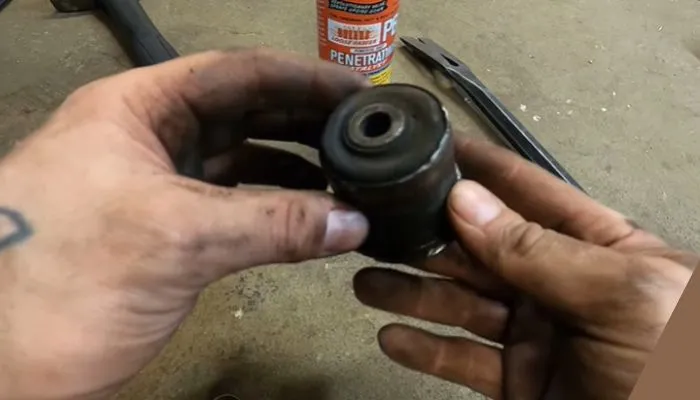
1. Worn Bushings Or Control Arm Joints
Worn bushings or control arm joints can cause your Jeep to squeak. These components are designed to absorb shocks and minimize vibration. Over time, they can wear out, leading to annoying squeaks as the metal parts rub against each other.
2. Dry Or Failing U-joints In Driveshafts
Dry or failing U-joints in driveshafts are another potential cause for the squeaking. When these joints lack grease or start to fail, they can produce a distinct squeaking sound, usually when you accelerate or decelerate.
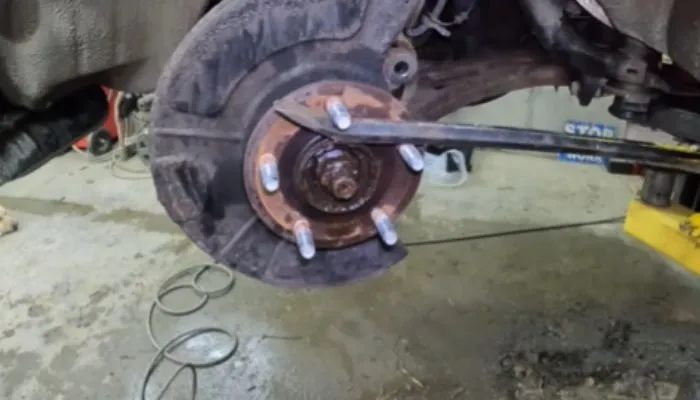
3. Faulty Wheel Bearings
Faulty wheel bearings can also contribute to squeaking in your Jeep. If the wheel bearings are worn or damaged, they may produce a high-pitched, continuous squeak, particularly when your vehicle is in motion.
4. Loose Suspension Bolts
Loose suspension bolts can lead to squeaking as well. If the bolts that hold your suspension components in place are loose, they can cause those components to shift and produce a irritating noise while driving.
5. Worn Out Suspension Components
Worn out suspension components, such as shock absorbers and struts, are common sources of squeaking. If these parts wear down or malfunction, they can create unsettling squeaking or creaking noises as you drive over bumps or rough roads.
6. Faulty Brake System
A faulty brake system can also be a reason behind the squeaking. Worn out brake pads can produce a high-pitched noise to alert you of the need for replacement.
7. Loose Or Damaged Belts
If your Jeep has loose or damaged belts, they can produce a noticeable squeak. As the belts slip or shift in the engine, they can generate an irritating, high-pitched sound.
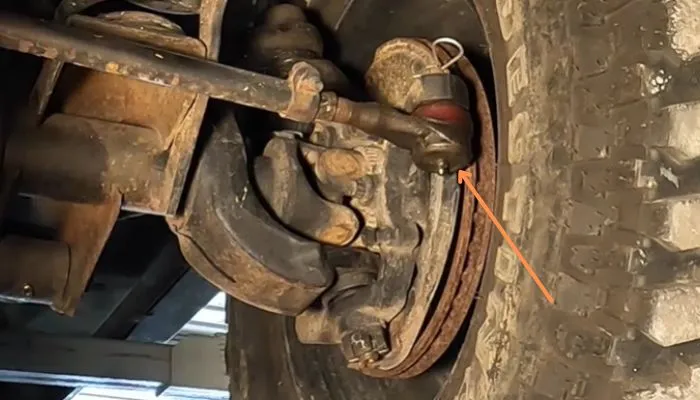
8. Insufficient Lubrication
Finally, insufficient lubrication in various components can lead to squeaking sounds. Proper lubrication is vital for reducing friction and minimizing squeaks in parts such as the steering system and suspension components.
ii) Tires And Wheels
When driving your Jeep, you may have noticed an annoying squeaking sound coming from the tires and wheels. This can be alarming and frustrating, but understanding the common causes of Jeep squeaking can help you diagnose and resolve the issue quickly. In this section, we will explore the three main culprits behind this bothersome sound: underinflated tires, loose lug nuts, and damaged tire tread or sidewall.
1. Underinflated Tires
One of the most common causes of Jeep squeaking is underinflated tires. When your tires are not properly inflated, the pressure is unevenly distributed, leading to friction between the tire and the road.
This friction can result in a squeaking noise as the tire rubs against the surface. To prevent this problem, regularly check your tire pressure and ensure it matches the manufacturer’s recommended PSI (pounds per square inch) value.
2. Loose Lug Nuts
Another culprit behind Jeep squeaking is loose lug nuts. Lug nuts are responsible for holding the wheel in place and maintaining its alignment. When these nuts become loose, the wheel can wobble, causing friction and resulting in a squeaking sound.
To address this issue, inspect your lug nuts regularly and make sure they are tightened to the proper torque specification. Additionally, consider using a torque wrench to ensure they are tightened evenly.
3. Damaged Tire Tread Or Sidewall
A damaged tire tread or sidewall can also lead to squeaking while driving your Jeep. When the tread or sidewall is compromised, the tire loses its ability to grip the road effectively, resulting in a squeaking noise as it slips or slides on the surface.
Inspect your tires regularly for any signs of damage, such as cuts, bulges, or uneven wear patterns. If you notice any issues, it’s important to replace the damaged tire promptly to ensure optimal safety and performance.
Other Sources
1. Loose Interior Trim Or Panels
If you hear squeaking while driving your Jeep, it could be due to loose interior trim or panels. These components, when not properly secured, can rub against each other or the vehicle’s frame, causing unwanted noise. Ensure that all interior trims and panels are tightly fastened to eliminate this potential source of squeaking.
2. Worn Or Dry Rubber Seals
Squeaking noises in your Jeep might also be caused by worn or dry rubber seals. Over time, rubber seals can lose their flexibility, leading to squeaking as they come into contact with other surfaces. Regularly inspect and replace any worn or dry rubber seals to reduce squeaking and maintain a quieter driving experience.
3. Leaky Fluids Contacting Hot Engine Components
Leaky fluids coming into contact with hot engine components can cause squeaking in your Jeep. When fluid leaks occur, such as oil or coolant, and they come into contact with hot surfaces, they can cause hissing or squeaking sounds. Regularly check for leaks and promptly address any issues to prevent this source of squeaking.
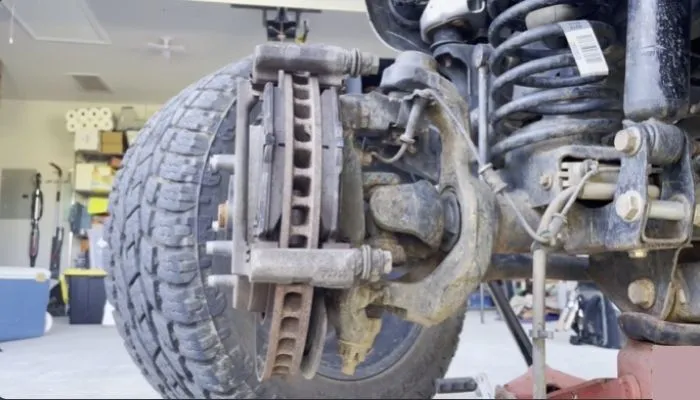
Why Do My Jeep Brakes Squeak?
When it comes to your Jeep, a squeaking sound while driving can be quite alarming. One of the most common culprits behind this noise is your brakes. So, why do your Jeep brakes squeak? Let’s explore some possible reasons below:
1. Glazed Or Worn Brake Pads
If your Jeep brakes are squeaking, one possible reason could be glazed or worn brake pads. Brake pads are a crucial component of your Jeep’s braking system, responsible for creating friction against the rotors to slow down and stop your vehicle. Over time, the brake pads can become glazed due to excessive heat, causing them to harden and lose their effectiveness.
Additionally, worn-out Brake pads that have reached their minimum thickness can also cause squeaking sounds. In such cases, a thorough inspection and replacement of the brake pads might be necessary to resolve the issue.
2. Sticking Brake Caliper
Another reason for your Jeep brakes squeaking could be a sticking brake caliper. The brake caliper is responsible for holding and pressing the brake pads against the rotors. If the caliper gets stuck, it may fail to fully release the brake pads, causing constant friction and resulting in a squeaking noise.
This often happens due to corrosion, dirt, or lack of lubrication. A malfunctioning brake caliper needs to be addressed promptly to prevent further damage to the braking system.
3. Dry Or Damaged Brake Hardware
Dry or damaged brake hardware can also contribute to squeaking brakes in your Jeep. Brake hardware, including clips, springs, and pins, ensure proper alignment and functioning of the brake components. If these parts become dry or damaged, they may not operate smoothly, causing the brakes to squeak.
Regular lubrication and inspection of the brake hardware can help prevent this issue. If any of the hardware components are severely damaged, they may need to be replaced to eliminate the squeaking sound.
How To Identify The Source Of The Squeak
If you own a Jeep and notice it squeaking while you drive, it’s important to identify the source of the noise to prevent further damage and ensure your safety. In this section, we will discuss some steps you can take to pinpoint the origin of the squeak and determine the appropriate solution.
1. Perform A Visual Inspection
The first step in identifying the source of the squeak is to perform a visual inspection of your Jeep. Start by examining the exterior of your vehicle, paying close attention to the suspension components, wheels, and tires. Look for any signs of wear, damage, or loose parts that could potentially be causing the squeaking noise.
Next, open the hood and inspect the engine compartment. Check the belts, pulleys, and hoses for any signs of wear or misalignment.
Additionally, inspect the steering components and the exhaust system for any visible issues that could be contributing to the squeak.
2. Listen For The Squeak
The next step is to listen carefully for the squeak while you are driving. Pay attention to when the squeak occurs – is it constant or does it only happen when you accelerate, brake, or turn? This information will help you narrow down the possible sources.
Try to listen for the squeak from different areas of your Jeep. Start by rolling down the windows and driving at a slower speed in a quiet area. Then, gradually increase your speed and listen closely for any changes in the sound. By pinpointing the location of the squeak, you can better determine the cause.
3. Test And Simulate The Squeaking Condition
To accurately identify the source of the squeak, it can be helpful to simulate the squeaking condition. For example, if you notice the squeak only happens when you brake, find a safe area to perform several controlled braking maneuvers. This can help you detect any issues related to the braking system.
Similarly, if the squeak occurs during turns, find an empty parking lot or a wide road and perform several turns in both directions. This will allow you to assess the condition of your Jeep’s suspension components and steering system.
4. Consult A Professional Mechanic
If you have followed the previous steps and still cannot determine the source of the squeak, it is recommended to consult a professional mechanic. An experienced mechanic will have the expertise and tools necessary to diagnose and fix the issue.
When explaining the issue to your mechanic, provide them with as much detail as possible. Let them know when and how the squeak occurs, any observations from your visual inspection, and the results of your own tests. This will assist the mechanic in quickly identifying the root cause of the squeak and providing the appropriate solution.
Remember, identifying the source of the squeak is crucial for maintaining the safety and performance of your Jeep. By following these steps, you can narrow down the possible causes and determine the best course of action to resolve the issue.
How Do I Stop My Jeep From Squeaking
Simple Fixes
Is the squeaking noise coming from your Jeep driving you crazy? Don’t worry, there are simple fixes that can help you stop the squeaking and get back to enjoying a smooth ride. In this section, we will explore three common solutions to address the issue:
1. Tighten Loose Bolts
If you notice a squeak, the first step is to check for any loose bolts. Loose bolts can contribute to vibrations that result in squeaking noises. Ensure that all bolts are tightened securely using the appropriate tools, such as a wrench or socket set. Pay close attention to bolts in the suspension, exhaust, and chassis components.
2. Check And Lubricate Brake & Engine Components
Squeaking can also occur due to friction between brake and engine components. Check the condition of your brake pads and rotors for any signs of wear. Replace any worn-out parts promptly. In addition, lubricate the brake calipers and ensure that they move freely without any resistance. Lubrication can also be applied to engine belts and pulleys to reduce friction-related noises.
3. Cleaning Components
Another common cause of squeaking is the build-up of dirt, debris, and rust on various components. Clean the suspension system, including the springs, shocks, and struts, using a mild detergent and water solution. Additionally, clean the brake components to remove any accumulated dirt or rust. Ensure the components are thoroughly dried after cleaning to prevent further corrosion.
| Simple Fixes for Squeaky Jeep |
|---|
| Tighten loose bolts |
| Check and lubricate brake & engine components |
| Cleaning components |
By implementing these simple fixes, you can eliminate the annoying squeaking sound from your Jeep and enjoy a quieter and smoother ride. Remember, regular maintenance and addressing squeaks promptly can prevent bigger issues down the road. Keep your Jeep in top shape and enjoy every adventure without the distraction of squeaks!
Replacing Worn Or Damaged Parts
Are you wondering why your Jeep is squeaking when you drive? One common cause of squeaking in a Jeep is worn or damaged parts. Understanding how to stop your Jeep from squeaking involves replacing these worn or damaged components. Let’s take a look at some key areas to focus on.
1. Bushings
Worn or damaged bushings are a common cause of squeaking in a Jeep. When the bushings in your suspension system wear out, they can no longer effectively absorb shocks and vibrations, leading to squeaking sounds. Regular inspection and replacement of worn bushings can help to eliminate squeaking noises in your Jeep.
2. Bearings
If you hear squeaking coming from your wheels, it might be a sign of worn bearings. Bearings that are old or damaged can produce squeaking, grinding, or whining noises. Checking and replacing worn wheel bearings can help to silence the squeaks and ensure smooth operation of your Jeep.
3. Pads
Brake pads that have become worn down or are in poor condition can lead to squeaking while driving. These worn brake pads can cause friction and create irritating sounds. Regularly checking and replacing worn brake pads is essential for preventing squeaking and maintaining safe braking performance in your Jeep.
How to Prevent Jeep Squeaking While Driving
If your Jeep is squeaking when you drive, it could be due to several factors. Routine inspection and lubrication of suspension components and steering linkage can help to alleviate the squeaking.
Additionally, checking the condition of the brake system can also contribute to identifying and resolving the issue. Regular maintenance can prevent and address squeaking noises, ensuring a smooth and quiet ride.
1. Regularly Inspect And Maintain Suspension
One of the primary reasons why your Jeep may squeak when you drive is due to issues with the suspension system. Regularly inspecting and maintaining your suspension can help prevent squeaking and ensure a smoother ride. Pay attention to the following components:
- Check for worn-out or damaged bushings
- Inspect the shock absorbers for leaks or signs of wear
- Ensure the control arms and ball joints are in good condition
- Examine the tie rod ends for any looseness or excessive play
Addressing any issues with these components promptly can help eliminate squeaking and prolong the lifespan of your suspension system.
2. Keep The Brake System In Good Condition
Your Jeep’s brake system plays a crucial role in ensuring safe and quiet rides. Any problems with the brake system can lead to squeaking noises while driving. To prevent this, follow these preventive maintenance tips for your brake system:
- Regularly check the brake pads for wear and replace them as needed
- Inspect the brake rotors for any signs of damage or uneven wear
- Ensure the brake calipers are functioning properly and not sticking
- Keep the brake fluid at the recommended level and replace it as per the manufacturer’s guidelines
By maintaining your brake system in good condition, you can avoid potential squeaking issues and ensure optimal braking performance.
3. Perform Routine Lubrication
Another preventive maintenance tip to keep your Jeep from squeaking while driving is to perform routine lubrication on certain parts. Lubrication helps reduce friction and noise in various components. Here are some areas that may require regular lubrication:
- Apply grease to the suspension bushings to minimize potential squeaks
- Lubricate the wheel bearings to ensure smooth rotation and reduce noise
- Grease the hinges and latches to prevent them from becoming stiff and noisy
- Regularly lubricate the drive shaft joints to minimize friction and vibrations
By incorporating routine lubrication as part of your preventive maintenance routine, you can keep your Jeep running smoothly and eliminate squeaking sounds on the road.
4. Follow the Recommended Service Schedule
Adhering to the recommended service schedule outlined in your Jeep’s owner manual is crucial for preventing issues that could lead to squeaking while driving. Regular maintenance can help detect and address potential problems before they escalate. Make sure to:
- Stick to the recommended oil change intervals for proper engine lubrication
- Replace the air filters regularly to ensure optimal airflow
- Check and maintain the proper fluid levels in your Jeep
- Inspect the belt and hose conditions to prevent potential squeaking
By following the recommended service schedule, you can stay on top of maintenance tasks and minimize the chances of squeaking noises while enjoying your Jeep adventures.
Why Does My Jeep Squeak When I Go Over Bumps
Your suspension most likely causes the squeak you’re hearing. Every time you hit a bump, your suspension components flex and rub against each other. Over time, this can cause the parts to wear down and start making noise.
There are a few things you can do to try and fix the problem.
First, check all of the bolts that hold your suspension components in place. If any of them are loose, tighten them up.
You may also want to lubricate the moving parts with a silicone-based lubricant. This will help reduce friction and hopefully quiet down the squeaking. If neither of those solutions work, it’s probably time to take your Jeep to a mechanic or 4×4 shop for further diagnosis.
They’ll be able to tell you for sure what’s causing the noise and make any necessary repairs.
Why is My Jeep Squeaking When I Turn
If you’re hearing a squeaking noise coming from your Jeep when you turn, it’s likely due to an issue with your suspension. The most common cause of this is worn-out suspension components, which can create a lot of friction and noise.
Another possibility is that your Jeep’s wheels are not properly aligned, which can also cause the suspension to work harder and make noise.
If you suspect that your suspension is the culprit, the best thing to do is take it to a qualified mechanic or dealership for inspection. They will be able to diagnose the problem and recommend the best course of action. In some cases, simply replacing worn-out parts may do the trick.
However, if there is more significant damage, such as to your Jeep’s frame or axles, then more extensive repairs may be necessary.
Wrapping Up
If your Jeep squeaks, don’t ignore it. Addressing the issue promptly can prevent further damage. By diagnosing the squeaking noise, you can ensure a smoother and safer ride. Whether it’s the suspension, brakes, or steering, regular maintenance and timely repairs will keep your Jeep running smoothly.
Don’t hesitate to seek professional assistance for any persistent squeaks!
FAQs
Can I drive my Jeep if it’s squeaking?
While some squeaks may not indicate a severe problem, it’s essential to have any unusual noises inspected promptly to prevent potential issues.
How much does it cost to fix squeaking issues?
The cost varies depending on the underlying problem. Routine maintenance is usually more affordable than extensive repairs.
Are squeaking brakes dangerous?
Squeaking brakes can be a sign of worn brake pads, which can affect your vehicle’s stopping power. It’s best to have them checked to ensure safety.
Can I lubricate my Jeep’s parts myself?
While some lubrication can be a DIY task, it’s advisable to consult your Jeep’s manual or seek professional help for proper maintenance.
Why Is My Jeep Squeaking When I Drive?
There could be several reasons why your Jeep is squeaking when you drive. One common cause is worn-out brake pads, which can produce a high-pitched squeaking noise. Other potential causes include issues with the suspension, steering components, or drive belt.
It’s best to have a professional mechanic diagnose and repair the issue to ensure your Jeep is safe to drive.
How Do I Fix The Squeaking Noise In My Jeep?
The first step in fixing the squeaking noise in your Jeep is to locate the source of the noise. If it’s coming from the brakes, you may need to replace the brake pads. If the noise is originating from the suspension or steering components, they may need to be lubricated or replaced.
It’s recommended to bring your Jeep to a certified mechanic for an accurate diagnosis and proper repairs.
Can A Loose Serpentine Belt Cause A Squeaking Noise In My Jeep?
Yes, a loose or worn-out serpentine belt can cause a squeaking noise in your Jeep. The serpentine belt is responsible for powering various components of the engine. If the belt becomes loose or worn, it may slip and produce a squeaking noise.
It’s important to have the serpentine belt inspected and replaced as necessary to prevent further damage to your Jeep’s engine.

